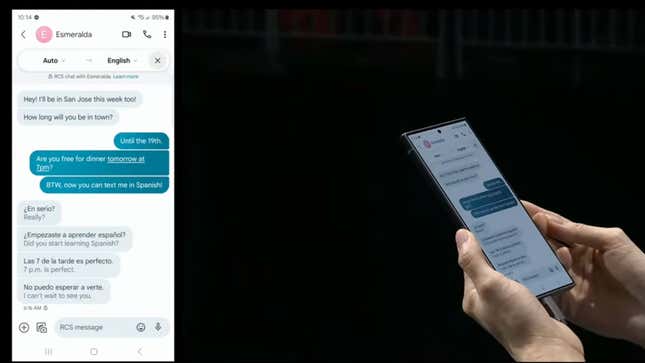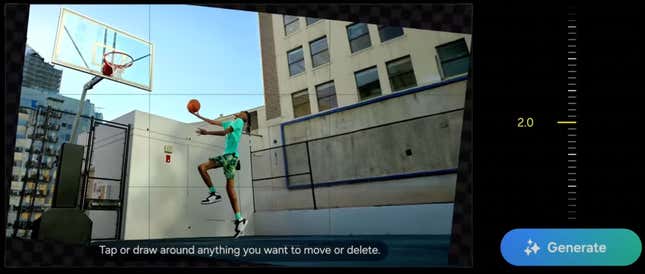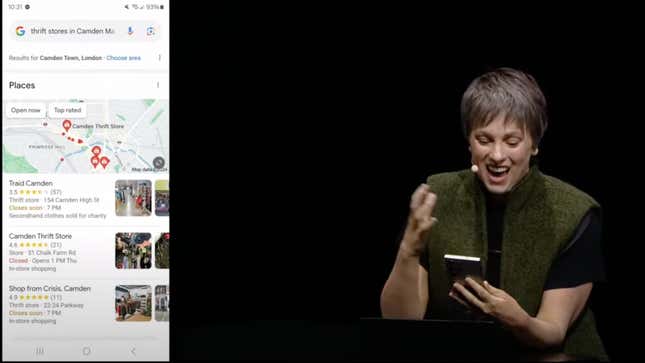Smartphones, AI, and rings, oh my! Samsung is at it again, coming out with its latest Samsung Galaxy S24 series phone with a list of long-expected features, a new titanium frame on the $1,300 Ultra edition, and a whole smattering of artificial intelligence surrounding every feature for its latest flagship phone. Oh, and apparently, the Galaxy Ring is real.
Let’s get to it.
A Whole New Galaxy Phone, Now in Titanium
First off, the new Samsung Galaxy S24 lineup includes the usual slate of a regular S24, an S24+, and a S24 Ultra. The first big change for the biggest, most expensive version is that the Ultra now sports a titanium frame akin to the iPhone 15 Pro.
For more details and full pics, check out Gizmodo’s coverage here.
Samsung’s AI-Centric Phone

Samsung devoted the absolute majority of its time to its phone’s new AI features. Dubbed “Galaxy AI,” these capabilities are a mix of on-device and cloud-based applications that are supposed to simplify life, as much as AI can possibly do in this day and age.
Up front and center is the automatic AI voice and text translation feature. Samsung claimed its Live Translation function can automatically interpret your voice in calls and then offer a computerized voice for what you said a second later. You’ll also see the text translations on-screen during the call. The person on the other end of the line also gets translated for your phone.
Along with a live translation interpreter app for when you’re talking to somebody in person, Samsung promoted Chat Assist as its other big translation feature specifically for text. In the phone’s default messenger, you can set it to automatically translate your ramblings into another language, with your original text appearing just under that new message. The phone can translate 19 languages, including Spanish, French, Japanese, Polish, Italian, Korean, and more.
Chat Assist should also offer your phone a much broader, Grammarly-like spellcheck service. On Google Messages, the AI can reinterpret your texts, generate new writing to sound more “lyrical,” or even make yourself more like “Shakespeare.” Google had previously shown off some of these features for chat on Android devices, but Samsung Keyboard can also change up your writing to be more “social” or “professional” on other apps.
Samsung Notes will now get access to Note Assist, which can completely reorganize your quick notes to add bullet points and headers for better comprehension. If you have terrible chicken scratch handwriting, Samsung said the Notes app will reorganize your words to be much more legible. Lastly, the speech-to-text transcription feature is getting a few AI upgrades that will help distinguish between speakers and create a summary of what was said in the recording.
Samsung’s S24 Will Offer Better Photos Directly from Instagram and Snapchat

And, of course, there are plenty of AI-enhanced features for editing photos. First, the company’s AI pixel replacement feature is there for removing objects in photos if you’re desperate to remove your annoying cousin from all your family photos. There are also additional features akin to Adobe Firefly that generate artificial parts of a photo by cropping or rotating the image beyond its borders. Hell, the system can generate artificial frames inside videos to make non-slo-mo videos appear like they’re in slow motion.
The company stressed its own photo enhancement features that can reduce noise and improve picture quality. Other features can automatically suggest editing out reflections, glare, or other unwanted artifacts from your photos. Samsung said every image that gets modified with AI gets a watermark that denotes the image as AI, as well as an additional tag in the metadata.
Instagram and Snapchat now have access to Samsung’s native photo features like motion photos and image stabilization. It will also have full HDR enabled for photos on Instagram. Now, there’s no need to have to duck out of each app to snap a photo before uploading it to those social apps.
Samsung and Google Promoting Even More AI On Your Phone or In the Car

Google made its next big AI announcement alongside Samsung, and it seems the companies are getting pretty buddy-buddy with this latest release. Both the Samsung Galaxy S24 and Pixel 8/8 Pro will be the first phones to get the Circle to Search feature. By holding on to the navigation bar, users can bring up a simple interface to swipe, circle, or poke at objects and text on any app, then use those to perform a full Google search.
In addition, Google is combining that feature with its own Search AI, and users can opt to get a response from their Circle to Search from the company’s Search Generative Experience or SGE. This will create AI responses to your queries when using Circle to Search or when using similar multisearch features in Google Lens.
Additionally, Samsung promoted the Galaxy S24 will still have some AI features enabled with Android Auto. Now, it can automatically summarize group messages, suggest relevant replies, and share your ETA.
Wait, Is That a Smart Ring? Wait No Don’t Go…
Samsung waited until the very end of its conference to surprise us all with a piece of tech some expected had landed in the fiery pits where all dead tech lands eventually. Though we’ve seen rumors and leaks for years now, the Galaxy Ring is real, but other than a few-second clip showing a render of the device, we didn’t get much or any details about what it’s capable of.
All Samsung promised was it would be a new piece of health tech to be a “personal health companion” through Samsung Health. It’s a “powerful and accessible health and wellness device” that will likely be very akin to the Oura Smart Ring. Hell, we don’t even really know what it looks like based on that teaser other than it will be shaped… like a ring.

Alex Mitchell is your go-to expert for all things mobile. With a passion for the latest smartphones, apps, and mobile innovations, Alex provides in-depth reviews, insightful analyses, and breaking news about the ever-evolving world of mobile technology. Stay connected with Alex to navigate the fast-paced realm of mobile devices.


